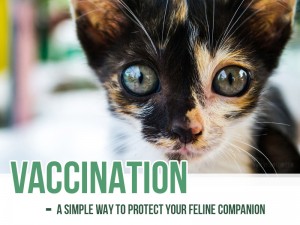
Vaccination A simple way to protect your feline companion

Unfortunately there are several life-threatening infectious diseases that can affect our pets and this is also true for cats. Vaccination has been the best protection for our feline companions from preventable death and it is still the simplest and most effective way of protecting them against these diseases.
Vaccinations work by stimulating a pet's immune system to produce antibodies against specific diseases without causing them to get sick. When our pets are vaccinated, they are injected with an attenuated form of those diseases which is unable to cause the disease but will trigger our pet's immune system to start producing antibodies against it. If the vaccinated pet ever comes across that disease again, its body will recognise it and immediately start producing the antibodies they need to fight it!
Kittens usually start their vaccination protocols when they are 9 weeks old and are routinely vaccinated against "cat flu", enteritis and feline leukemia. In general, these are given in two vaccines administered two weeks apart, followed by annual boosters.
Cat Flu is very similar to a human cold causing respiratory disease. Affected cats will have a discharge from their nose and eyes, an elevated temperature, depression, cough and sneezes. It is not usually serious in adult cats but it can be dangerous for kittens or for older cats. The main causes for Cat Flu are viruses (the Feline Herpes Virus or the Feline Calicivirus) but other agents (such as the bacteria Bordetella bronchiseptica) can also contribute this disease. The condition is spread from cat to cat through direct contact, through sneezing, or shared food bowls.
Feline Infectious enteritis (panleucopenia) causes severe vomiting and diarrhoea and it is often fatal for kittens. It is caused by a virus very similar to the one that causes 'parvo' infections in dogs and affected cats will pass the virus in their faeces. This virus can survive for a long time in the environment and common disinfectants are not very effective against it.
Feline leukemiais caused by a virus that attacks the immune system and leaves the cat more susceptible to other infections, anaemia and even tumours. This virus is often compared with the human HIV virus, as it affects cats in a similar way. Feline leukemia is transmitted through direct contact, often through mutual grooming, fighting or mating. Kittens can also get it through their mother while they are still in their womb or through their milk. None of these conditions are transmissible to humans.
A pet's vaccination schedule should be defined according to its particular needs and lifestyle, which means your vet may suggest a different vaccination plan depending on your cats' individual situation: an indoor cat may have a different vaccination schedule than an outdoor cat for example. It will also vary with the manufacturers' specifications for the vaccines involved.
Would you like to know more about cats? Check our Feline Courses:
Feline courses
Published: 13 Oct 2015
Read the previous article: Nosebleeds in horses

